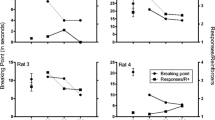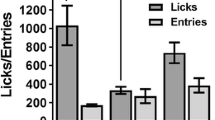Abstract
Keypecking in one group of pigeons was maintained under schedules in which food was presented only when a specified number of responses was followed by a 30-s pause without a response. d-Amphetamine and pentobarbital increased low rates of responding (and, thus, decreased food presentation) only after initial injections or when, during drug sessions, responses during the 30-s period did not reset the period. When responses during the pause-interval postponed food delivery, the rate-increasing effects of both drugs diminished over succeeding administrations. Thus, immediate effects of response consequences were as influential as the actual presence of a drug in determining the reproducibility of the behavioral effects of that drug. In a second experiment, keypecking in another group of pigeons was maintained under a 10-min fixed-interval schedule of food presentation but suppressed by a 100-response fixed-ratio schedule of shock delivery (punishment). d-Amphetamine and pentobarbital increased low rates of punished responding when shock delivery was eliminated during drug sessions. Pentobarbital, but not d-amphetamine, also increased punished responding when shock delivery was present. Rate-increasing effects of these drugs were determined by not only predrug patterns of responding but also effects of reinforcers and punishers that occurred during exposure to the drug.
Similar content being viewed by others
References
Azrin, N. H.: A technique for delivering shock to pigeons. J. exp. Anal. Behav. 2, 161–163 (1959)
Brethower, D. M., Reynolds, G. S.: A facilitative effect of punishment on unpunished behavior. J. exp. Anal. Behav. 5, 191–199 (1962)
Dews, P. B.: Studies of behavior. IV. Stimulant actions of methamphetamine. J. Pharmacol. exp. Ther. 122, 137–147 (1958)
Dews, P. B.: Free-operant behavior under conditions of delayed reinforcement. I. CRF-type schedules. J. exp. Anal. Behav. 3, 221–234 (1960)
Dews, P. B.: Psychopharmacology. In: Experimental foundations of clinical psychology, A. J. Bachrach, ed., pp. 423–441. New York: Basic Books 1962
Dews, P. B.: A behavioral effect of amobarbital. Naunyn Schmiedebergs Arch. exp. Path. Pharmak. 248, 296–307 (1964)
Ferster, C. B., Skinner, B. F.: Schedules of reinforcement. New York: Appleton-Century-Crofts 1957
Geller, I., Seifter, J.: The effects of meprobamate, barbiturates, d-amphetamine and promazine on experimentally induced conflict in the rats. Psychopharmacologia (Berl.) 1, 482–492 (1960)
Hanson, H. M., Witoslawski, J. J., Campbell, E. A.: Drug effects in squirrel monkeys trained on a multiple schedule with a punishment contingency. J. exp. Anal. Behav. 10, 565–569 (1967)
Kelleher, R. T., Morse, W. H.: Determinants of the specificity of the behavioral effects of drugs. Ergebn. Physiol. 60, 1–56 (1968)
Laties, V. G.: The modification of drug effects on behavior by external discriminative stimuli. J. Pharmacol. exp. Ther. 183, 1–13 (1972)
Laties, V. G., Weiss, B.: Influence of drugs on behavior controlled by internal and external stimuli. J. Pharmacol. exp. Ther. 152, 388–396 (1966)
McKearney, J. W.: Rate-dependent effects of drugs: modification by discriminative stimuli of the effects of amobarbital on schedule-controlled behavior. J. exp. Anal. Behav. 14, 167–175 (1970)
McMillan, D. E.: Drugs and punished responding. I: rate-dependent effects under multiple schedules. J. exp. Anal. Behav. 19, 133–145 (1973)
Overton, D. A.: State-dependent learning produced by depressant and atropinelike drugs. Psychopharmacologia (Berl.) 10, 6–31 (1966)
Schuster, C. R., Dockens, W. S., Woods, J. H.: Behavioral variables affecting the development of amphetamine tolerance. Psychopharmacologia (Berl.) 9, 170–182 (1966)
Author information
Authors and Affiliations
Rights and permissions
About this article
Cite this article
Smith, J.B., McKearney, J.W. Changes in the rate-increasing effects of d-amphetamine and pentobarbital by response consequences. Psychopharmacology 53, 151–157 (1977). https://doi.org/10.1007/BF00426485
Received:
Accepted:
Issue Date:
DOI: https://doi.org/10.1007/BF00426485




